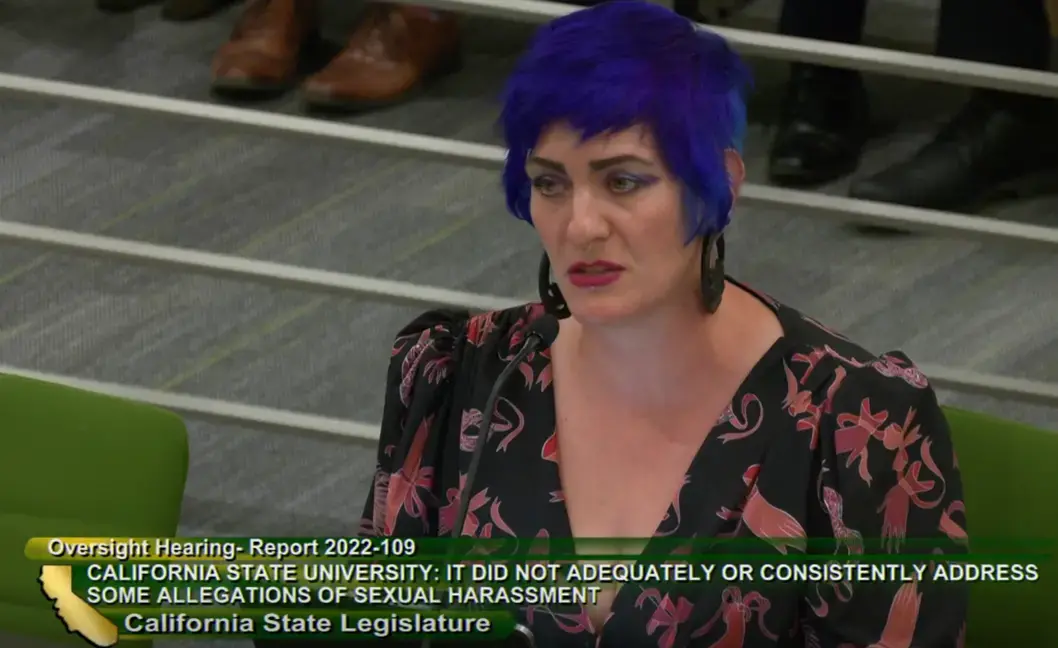State Audit Highlights CSU’s Mishandling of Title IX Violations of Sexual Misconduct
State auditors presented a damning audit report August 31 indicating the CSU’s failure to adequately respond to Title IX violations of sexual misconduct.
Title IX federal laws are intended to protect all people, regardless of their sex or gender, from discrimination of any kind in an educational institution. Title IX covers all forms of sexual harassment and sexual violence.
CFA members advocated for this audit in order to address the failure of leadership and lack of management accountability in the CSU’s handling of Title IX cases.
CFA Sacramento President Anne Luna-Gordinier pointed out how the legislative audit, hearing, and other efforts have disrupted CSU management’s business-as-usual approach to Title IX compliance.
“We are here having this conversation to prevent sexual assault and harassment. The lack of funding and implementation across campuses has led to a reliance on punitive approaches established through decades of public policy, which has not been proven to prevent harm. We need to focus on building new norms and systems of accountability,” said Luna-Gordinier, a professor at Sacramento State.

This is not the first time a state auditor has reported the CSU’s failure to adequately handle sexual harassment and sexual violence complaints.
In 2014, the California State Auditor found that several CSU universities needed to improve their processes for responding to these incidents.
Furthermore, the state auditor recommended an increased effort in preventing and monitoring these incidents.
Sadly, many of findings in the 2023 audit report mirrored those from 2014.
California State Auditor Grant Parks noted that they had strongly recommended the CSU to do campus oversight reviews for compliance with Title IX in 2014. However, without reason, the chancellor’s office simply stopped monitoring Title IX compliance in 2018. Parks stated that “the recommendation was evidenced by the chancellor’s Title IX coordinator, the general counsel, and the executive vice chancellor, who all noted the same problems that would later be uncovered in this audit.”
But following through with the recommendations is another issue. The most recent audit discovered that campuses do not routinely follow the recommendations given to them, especially when there is a lack of accountability from the chancellor’s office.
Parks found that the CSU lacked a standardized investigation process into sexual allegations. Many campuses developed lists of sexual harassment cases that omitted key information, such as the type of alleged misconduct, the names of the parties involved, and the key dates of the outcomes.
It was also discovered that there was no clear requirement for a secondary review or someone else to review a file before an issue is declared resolved.
Indignant legislators also pointed to the need for changes to the CSU’s policy on retreat rights, something Parks referred to as being “overly permissive.”
Also upset by the leniency of retreat rights, Assemblymember Jim Patterson added, “I just find it inexplicable that an institution that has the responsibility of training our next generation would engage in these kinds of practices that are so egregious to fairness and justice.”
Cozen O’ Connor, the law firm commissioned by CSU trustees to investigate sexual misconduct claims, also recently released a report. Though the two reports came from different perspectives, both arrived at the same conclusion overall.
CSU’s failure to set expectations, ensure consistency, monitor the timeliness of complainants’ responses, and deliver justice have led students, faculty, and staff to lose faith in the process.
“The reality is that there are too many cross interests and power dynamics at play on each campus that lead to inequitable solutions and situations. We appreciate the Cozen O’Connor report for identifying the lack of resources for Title IX as a problem, but we are also concerned with the potential for more resources to flow into and perpetuate a flawed system,” said Luna-Gordinier. Watch her testimony starting at 3:36:00.
“I don’t want excuses. I want change,” said Assemblymember Liz Ortega.
“Real harm has been done to real people and many lives have been gravely damaged because of the inability of the university to act in a timely manner and protect people from sexual harassers,” said Assemblymember Jim Wood.
Assemblymember Lola Smallwood-Cuevas emphasized how all of these oversights would have grave consequences for women of color. “The audit was clear in the findings that those who were most impacted by these violations were women of color. How can we ensure that we are elevating marginalized groups that have been disenfranchised from institutions if these institutions become bastions for predators and violators?”
CSU’s lack of accountability did not go unnoticed during the hearing. Smallwood-Cuevas wanted to make sure that women were seen. She asserted, “If CSU isn’t a safe place for Black, brown, AAPI women, then we might as well throw our hands up. I know from my previous work that one of the leading causes of absenteeism for women is sexual harassment and discrimination.”
“We are at a crossroads where we can change at a more profound level. There are many constructive recommendations in this audit in which we hope to continue to engage. We would like to call on all of us to take this opportunity to reimagine the institutional processes that led to these systemic failures and to create real cultural change centered on our students, faculty and staff, past and present,” Luna-Gordinier testified.
A CFA co-sponsored Title IX bill, SB 808, currently sits on the governor’s desk. If passed, the bill would require the CSU to submit an annual report to the Legislature on the investigations of sexual harassment reports and formal sexual harassment complaints.
Join California Faculty Association
Join thousands of instructional faculty, librarians, counselors, and coaches to protect academic freedom, faculty rights, safe workplaces, higher education, student learning, and fight for racial and social justice.